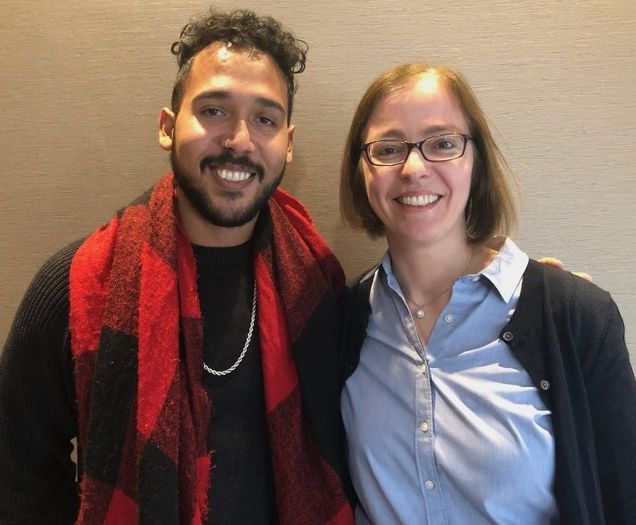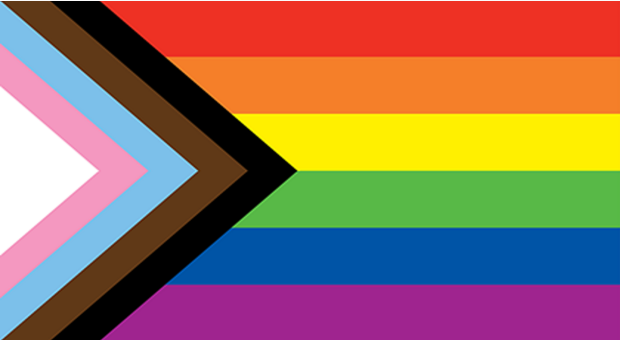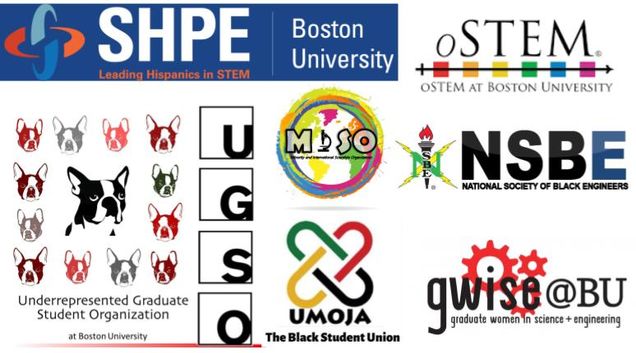Diversity, Equity, Inclusion, and Justice
Our Mission
In the Summer of 2020, the Graduate Program for Neuroscience (GPN) faculty and students formed a committee to facilitate anti-racism actions that the BU neuroscience community can take to improve the quality of student life and professional development at the institution.
Systemic oppression is multifaceted and continues to challenge the integrity of diversity, equity, and inclusion in academia. The mission of the Diversity, Equity, Inclusion, and Justice (DEIJ) Committee is to establish the Graduate Program for Neuroscience as a leader in the promotion and training of future neuroscientists in an anti-racist, anti-ageist, anti-sexist, anti-ableist, anti-classist, anti-homophobic, and anti-transphobic environment.
The GPN DEIJ Committee acknowledges and embraces the intersectionality of identities within the neuroscience community just as it recognizes and welcomes the multidisciplinary nature of neuroscience. With our strong commitment, we will work towards dismantling systemic oppression by promoting diversity, equity, and inclusion to bring about justice in neuroscience and academia at Boston University. More information about the DEIJ Committee can be found on the committee’s webpage.
Diversity & Inclusion Recruitment Initiatives
Honoring Pride Month 2021
Happy Pride! This June, we are celebrating the LGBTQ+ members of our Neuroscience community, and committing to the creation of a safe and welcoming campus for everyone. While we have so much to celebrate, there is still significant work ahead to achieve true equality for LGBTQ+ people. Estimates suggest that LGBTQ+ folks are 17-21% less represented in STEM than statistically expected based on their prevalence in the US population. If you’re looking for ways to support LGBTQ+ folks in STEM, consider initiatives from organizations like 500 Queer Scientists, oSTEM, and NoGLSTP. Also check out this list of LGBTQ+ Resources from BU and Beyond and this list of recommended reads from LGBTQ+ authors.
Research Spotlight

Michael Rosario, a GPN PhD student, and his advisor Dr. Karin Schon are studying the effects of chronic stress due to experiences of racism on brain structure and function. A description of this important work recently appeared in BU’s Alzheimer’s Disease Center Bulletin:
我们
Fi
If you’re a healthy Black adult between 50 and 80 years old with no neurological or psychiatric conditions and are interested in learning more about this study, please call 617-358-5382 or email JoinADC@bu.edu.
Diversity-Focused Student Groups
GPN students are members and leaders of many organizations on campus. Here are a few groups specifically focused on DEIJ efforts:
- Underrepresented Graduate Student Organization (UGSO)
- Out in Science, Technology, Engineering, and Math at Boston University (oSTEM)
- Graduate Women in Science and Engineering (GWiSE)
- Minority and International Scientists Organization (MISO)
- National Society of Black Engineers (NSBE)
- Society of Hispanic Professional Engineers (SHPE)
- UMOJA: The Black Student Union
Reporting a Bias Incident
Community is what holds us together, and it is essential that we support each other and lift each other up. If you experience a bias incident, there are people within our GPN community ready and able to help. There are also resources available at the university level.
- If you would like to handle a situation within the Graduate Program for Neuroscience community, we have four GPN Community Points of Contact (two faculty members and two students) who have volunteered to assist with handling bias incidents. These points of contact can help you navigate the University’s reporting system, and/or initiate a constructive discussion with the offending party (for instance, surrounding the use of micro-aggressions) .
- GPN Community Points of Contact:
- ResourcesThe Office of the Ombuds is a safe place to go for off-the-record conversations on issues related to life, work, or study at Boston University. Talking to the Ombuds can be a good first step if you don’t know where to turn for help.
- The Dean of Students Office has a system in place for reporting cases of alleged unlawful discrimination or harassment.
On-Campus Resources
- BU Office of Diversity & Inclusion
- Howard Thurman Center for Common Ground
- Center for Antiracist Research
- BU Disability & Access Services
- BU Center for Gender, Sexuality & Activism
Readings & Additional Resources
- Black in Neuro Webpage (Includes List of Fellowships for Graduate Students)
- Understanding the Climate for LGBTQ Workers
- Anti-Racism Resources
- Scaffolded Anti-Racist Resources based on the Intercultural Development Inventory Assessment Tool
- Guidelines for collecting data on sexual orientation and gender identity
- Resources compiled by the GPN 2019 Entering Cohort
- How LGBT+ scientists would like to be included and welcomed in STEM workplaces (Nature)









